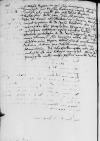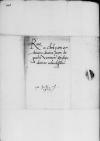Reverendissimo in Christo Patri et Domino, domino ⌊Ioanni Dei gratia Varmiensi episcopo⌋, domino colendissimo
Reverendissime Domine, domine colendissime.
Officiosissimam servitutis meae commendationem.
Redditae mihi sunt litterae Reverendissimae Dominationis Vestrae, quibus spem nobis ostendit sui ⌊ad nos⌋ adventus, atque una accomodari sibi cupit de habitatione commoda non procul a reverendissimo ⌊domino meo Plocensi⌋. Quas litteras cum se ⌊Mauricio⌋ dedisse scribat, hactenus a nobis visus non est, neque satis mirari possum, quid illo sit actum. Qui eas reddidit, famulus fuit reverendissimi domini ⌊archiepiscopi⌋; ⌊Lovicii⌋ se accepisse dicebat. Sed neque cubicularius comparet, cui se ⌊Mauricium⌋ adiunxisse scribit Reverendissima Dominatio Vestra, quod magis etiam nobis mirum accidit. Qua de re vero maxime misit ⌊Mauricium⌋, ut quantocius certior fieret, qui nuptiis dies dictus sit, nihil adhuc ea de re constitutum esse sciat.
Ceterum heri venerunt a serenissimo domino ⌊Romanorum rege⌋ legati: dominus ⌊Sigismundus ab Erberstein⌋ et dominus Adamus Caroli. Ex iis certi aliquid cognoscemus ac primo quoque tempore perscribentur omnia Reverendissimae Dominationi Vestrae. De domo curae futurum est reverendissimo ⌊domino meo Plocensi⌋ et mihi una. Plura per ⌊Mauricium⌋, quem exspectamus cupide.
⌊Cracovia⌋, tertio Calendas Iulii 1542.
Eiusdem Reverendissimae Dominationis Vestrae servitor deditissimus ⌊Stanislaus Hosius⌋ cantor et canonicus Sandomiriensis
Postscript:
Serenissima
⌊maiestas regia⌋ in ipso suo ⌊Cracoviam⌋ ingressu consueto morbo suo laborare coepit, quae causa est, quod hic Absalon diutius detinetur. Sed iam, Deo sit gratia, convalesc[it] ita, ut brevi absolutum iri sperem. Qualem cupit equum Reverendissima Dominatio Vestra, difficile ⌊hic⌋ est reperire, hoc praesertim tempore, quo sibi quisque optimos equos curatos vult.
Omnia mandata Reverendissimae Dominationis Vestrae exposui reverendissimo ⌊d[omino] meo Plocensi⌋. Suo tempore curae illi sunt futura, cum ⌊regia maiestas⌋ fuerit confirmatior. Plura scribam per Absalonem aut per ⌊Mauricium⌋. De ⌊Alexandro⌋, quae acta sint, ex inclusis ad me litteris cognoscet, quas domino ⌊praeposito⌋ mitti, mihi postea remitti velim.


